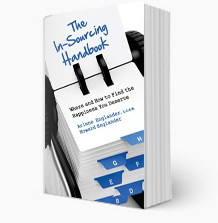In-Sourcing Blog
Roles in the Victim Triangle
I’ve written before about the Victim Triangle, the construct that keeps all of us Victims as we cycle through the roles of Persecutor, Rescuer and Victim, unable to exist one without the other.
Victims reside in the wounded shadow of their inner child, believing themselves vulnerable, needy and powerless, always on the lookout for someone stronger or more capable of taking care of them. Rescuers see themselves as “helpers” and “caretakers.” They need someone to rescue in order to feel vital and important. Persecutors seek control and argue that attacks are warranted and necessary for self-protection.
What makes it so difficult to break free of the Victim Triangle is the ease with which each participant is prompted to switch roles within the same story! For example, the Rescuer coming to defense of the Victim simultaneously becomes the Persecutor of that Victim’s Persecutor. Or a Victim, angry at not being rescued, turns into a Persecutor lashing out at the potential Rescuer. Or a Rescuer might feel unappreciated and transition into the Victim role. and so it goes, an endless game of musical chairs.
The script is flipped, but conflict continues. Curiously, no matter where we may be on the triangle initially, ultimately Victim is where we end up as we automatically rotate through the positions.
The healthy goal of course is to break this cycle of behavior and become totally responsible for your own feelings/behaviors, your own happiness. The insightful, contemporary poet, Mary Oliver, offers a wonderful poem, “The Journey,” as a lyrical expression of being free of the victim drama. I return to it often to remind myself, as she concludes in her poem, the only life you can save is your own.
The Journey
One day you finally knew
what you had to do, and began,
though the voices around you
kept shouting
their bad advice —
though the whole house
began to tremble
and you felt the old tug
at your ankles.
“Mend my life!”
each voice cried.
But you didn’t stop.
You knew what you had to do,
though the wind pried
with its stiff fingers
at the very foundations,
though their melancholy
was terrible.
It was already late
enough, and a wild night,
and the road full of fallen
branches and stones.
But little by little,
as you left their voices behind,
the stars began to burn
through the sheets of clouds,
and there was a new voice
which you slowly
recognized as your own,
that kept you company
as you strode deeper and deeper
into the world,
determined to do
the only thing you could do —
determined to save
the only life you could save.
~ Mary Oliver ~
The Victim Triangle provides a valuable framework for understanding the dynamics of conflict and dysfunction in relationships. Perhaps the most important take-away is, we are not inherently victims, except by choice.

